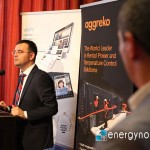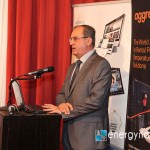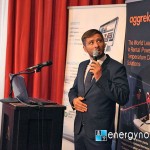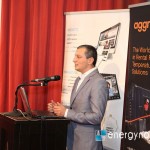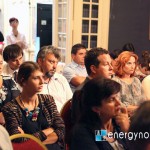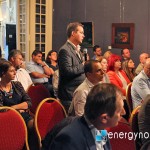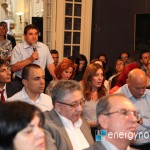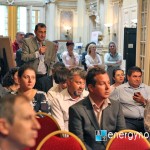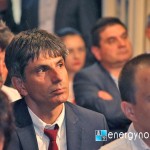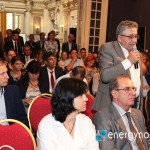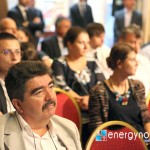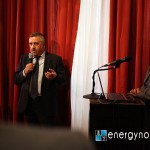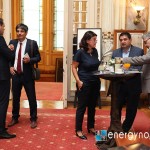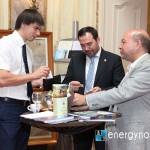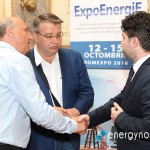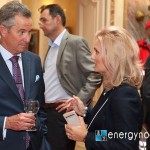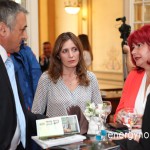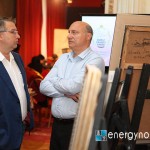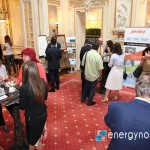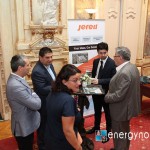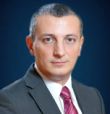Natural gas market in Romania is at a crucial moment which requires extensive changes in legislation within a very limited timeframe, agreed both Aristotel Jude (Ministry of Energy) and Emil Calotă (ANRE) on the occasion of Energy Breakfast Club, on August 31. The next six months are crucial to come up with suitable answers, not only to meet European obligations, but especially in order to build a functional and feasible gas market. In this regard, the ministry is working with ANRE and with actors in the market to bring the legislative clarifications so that the Petroleum Law to regulate the rights and obligations of the producers within the boundaries of their perimeters, and Gas Law (Law 123) to provide the operating framework for natural gas supply, distribution and transportation activities.
Aristotel Jude presented the guidelines of the future legal framework for O&G sector, meant to stimulate the market to function on three basic principles: transparency, non-discrimination and competition.
Transfer of ownership will be made at VTP level
Natural gas transportation activity is one of the key prerequisites for the proper functioning of the market, and a major problem in this area is the virtual trading point (VTP) and how the reservation of transmission capacity is made, started Jude. “It’s very important to have a fair division of how to reserve capacity; having capacity reservation at entrace – which is giving the network user the right to carry natural gas to VTP, and having capacity reservation for exit – which is giving the network user the right to extract natural gas from VTP. This is a requirement derive from European regulations,” Jude said.
GEO for increasing liquidity on the centralized markets
To enable commercial balancing in national transport system, we need a liquid market. Currently, the market is illiquid and do not provide the necessary support of intra-day transactions.
Therefore, the Ministry of Energy will launch a public consultation to promote GEO in order to stimulate transactions on centralized markets. “One of the changes is to limit the temporal applicability of Article 124, letter e) of Act 123,” Aristotel Jude said.
a
a
“This change will represent a huge step forward towards the free formation of a real gas price on the market “, said the representative of the Ministry of Energy. Currently, “article 124 puts on the market natural gas from domestic production at an administrative price, with priority for suppliers, who then resell gas to the domestic consumer under a final regulated price.” So we have two administrative decisions imposing the entry and the exit price on natural gas market. “We’re talking about a significant amount of 4 billion cubic meters per year,” Jude said.
Gas suppliers, brought on centralized market by force of law
“In the gas market, there are bilateral contracts for 98.5% of Romania’s consumption. On centralized markets it was only traded 1.5%, ie only 1.7 million MW out of a toal consumption of 121 million MW” announced Aristotel Jude. However, there is no market without transactions. Therefore, the Ministry of Energy intends to amend a article so as “to establish the obligation for gas suppliers to purchase needed for domestic, regulated consumers, in a transparent, non-discriminatory and competitive manner”, up to 40% of their annual porfolios.
ANRE finds resistance to change in natural gas sector
The regulator has a vision different from that set by the Ministry of Energy, Emil Calotă, vice-president of the National Regulatory Authority for Energy, stressed from the very begining. Emil Calotă insisted on the fact that liberalization of the electricity market was a success and currently it is the main model for the next steps in the development of gas market. “The major difference that occurs in connection with market liberalization is related with safety, with the security of supply of natural gas, and the state under UE Regulation 994 / 2010 is obliged to intervene in order to prevent any gaps in the supply of gas to the end consumer, in the period winter,” Emil Calotă said.
ANRE assessment identified a conservative attitude, a certain resistance to change in the natural gas sector. Eventually, the number of relevant players in the natural gas market is quite small. “Together with them and with the Ministry of Energy we are ready to discuss for identifying the solid and coherent ways to intervene in the legislative framework, observing the principles of legislative stability and predictability,” Emil Calotă said, stressing that the deadline is 31 March 2017, “when at least two regulatory acts shall cease to apply.”
“The Romanian state has not yet implemented in a solid and coherent manner the three important regulations on 1. security of supply, 2. access to transport infrastructure and 3. network code,” added the vice-predident of ANRE.
It was a mistake from ANRE to accept the six postponements in implementing the network code, Emil Calotă said. “At the end of last week, we accepted another extension until 1 November 2016, but we will make a serious control: why the SCADA system is not working, why the IT system is not functioning etc. It is clear that there is an attitude at the system operator level that needs to be corrected,” Emil Calotă warned.
Temporary power solutions from Aggreko
Cătălin Ţocu, Business Development Manager at Aggreko, presented a case study related to the company’s ability to provide temporary solutions for power and temperature control. Aggreko is the world leader in this area and works for all types of clients, from the entertainment industry – to construction, from military industry – to agriculture, froom pharma – to O&G, refining and utilities. An international reference project is supplying of 110 MW in only six weeks to cover the needs at the nuclear power plant in Fukushima, immediately after the 2011 disaster.
Cătălin Ţocu briefly presented the results of Aggreko’s cooperation with OMV Petrom, which began back in 2009 and reached currently 14 units for associated petroleum gas recovery designed and implemented by Aggreko. Among the solutions there is SCADA monitoring, gas and electricity production output, following the highest QHSE standards in the field, as well as operating and performing high quality maintenance on the equipment.
As a result, OMV Petrom has a annual production of over 240,000 MWh, form Aggreko’s unit only, which in financial terms, means a significant reduction in costs. With the solutions proposed by Aggreko, the customer benefits of flexible and quick deployment, high reduction of carbon footprint, energy production at place of consumption, in remote areas.
DOWNLOAD THE PRESENTATION OF CĂTĂLIN ŢOCU
Over 50 representatives from Amromco Energy, ACFR, ACUE, Aderro GP Energy, AFEER, Aggreko, Ambasada Rusiei, Ambasada SUA, Ambasada Ungariei, ANRE, Atlas Inexco RO, Black Sea Oil & Gas, BRM (Bursa Română de Mărfuri), Distrigaz Sud, E.ON Energie Romania, Edison Trading SpA – subsidiara România, ELCEN, Electrica Furnizare, Enel Energie, EnerCap Capital Partners, Energie Finanzierung Und Kapital, Forte Gaz GN, Investisia Group, Jereh, Matei Conf Group, MET Group, ministerul Energiei, ministerul Fondurilor Europene, MOL România, NextEnergies Consultants, NIS Petrol, OMV Petrom, OPCOM, Raiffeisen Bank, Romgaz, ROPEPCA, RWE, SGS România, Siveco România, Transgaz, Weatherford. attended the presentations and participated in discussions.
The event was organized by energynomics.ro and supported by our partners: Aggreko, Jereh, Matei Conf Group, Romgaz, Ridgid, SGS România, Transgaz.
Participation
This year, energynomics.ro aims to organize at least 5 more Energy Breakfast Club meetings. The schedule and the proposed themes are here.

